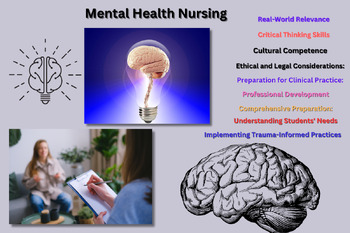Mental Health Nursing
Anthony Okoye
9 Followers
Description
Integrating mental health nursing into an educator's toolkit offers several benefits, enhancing their ability to support students' holistic well-being and academic success:
- Understanding Students' Needs: Educators equipped with knowledge about mental health nursing gain a deeper understanding of the diverse mental health needs of their students. This understanding allows them to recognize signs of distress, provide appropriate support, and refer students to mental health resources when needed.
- Promoting Mental Health Literacy: Educators play a pivotal role in promoting mental health literacy among students, fostering a supportive and inclusive learning environment. By incorporating concepts from mental health nursing into their teaching, educators can raise awareness about mental health, reduce stigma, and encourage open dialogue about mental health issues.
- Implementing Trauma-Informed Practices: Mental health nursing principles emphasize trauma-informed care, recognizing the impact of trauma on individuals' mental health and well-being. Educators can integrate trauma-informed practices into their teaching approaches, creating safe and supportive learning environments that promote healing and resilience among students who have experienced trauma.
- Supporting Student Well-Being: Educators trained in mental health nursing can effectively support students' well-being by implementing strategies to promote positive mental health and resilience. They can incorporate self-care activities, stress management techniques, and mindfulness practices into the curriculum to help students develop coping skills and enhance their emotional regulation.
- Identifying At-Risk Students: Educators who are knowledgeable about mental health nursing are better equipped to identify students who may be at risk of mental health challenges. By recognizing early warning signs and risk factors, educators can intervene proactively, connect students with appropriate support services, and prevent the escalation of mental health issues.
- Collaborating with Mental Health Professionals: Educators play a collaborative role in supporting students' mental health and well-being. By understanding the principles of mental health nursing, educators can effectively collaborate with mental health professionals, including school counselors, psychologists, and nurses, to develop comprehensive support plans and ensure coordinated care for students with mental health needs.
- Enhancing Professional Development: Incorporating mental health nursing concepts into professional development opportunities allows educators to enhance their skills and knowledge in supporting students' mental health. Training sessions, workshops, and continuing education courses on mental health nursing equip educators with practical strategies and resources to address mental health concerns effectively in the educational setting.
In summary, integrating mental health nursing into an educator's toolkit benefits both educators and students by fostering a supportive, inclusive, and mentally healthy learning environment. Educators equipped with knowledge about mental health nursing can promote mental health literacy, implement trauma-informed practices, support student well-being, identify at-risk students, collaborate with mental health professionals, and enhance their professional development to better meet the holistic needs of their students.
Total Pages
Answer Key
N/A
Teaching Duration
N/A
Report this resource to TPT
Reported resources will be reviewed by our team. Report this resource to let us know if this resource violates TPT’s content guidelines.





